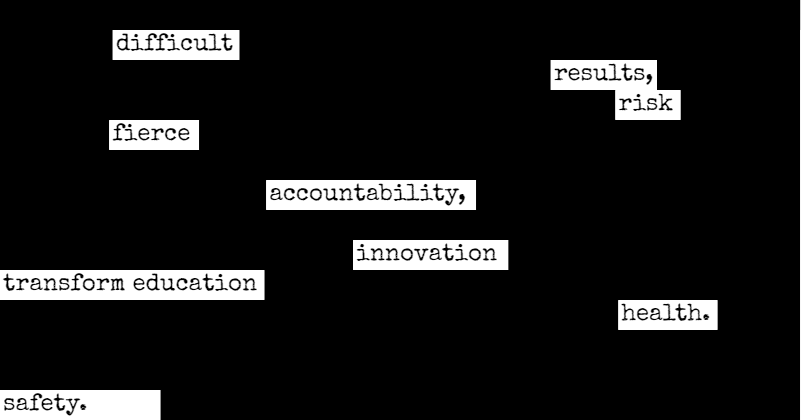by Jen Hoyer
Looking over the CUNY budget request and financial statements was a good reminder of the incongruities between desire and reality in financial bureaucracy. The CUNY budget request reads like a piece of marketing (which it is). The financial statements, on the flip side, were prepared by accountants as a financial audit. Budget reporting lines don’t match the categories set out in the request. Requests are carefully outlined according to categories that are used to lobby politicians (and curry favor with the public) but that ultimately might not matter to the folks who approve spending.
What this highlights for me is that a funder (in this case, the state) might agree with proposed spending lines — even budget lines that fall into seemingly idealistic or value-laden categories — but that same funder somehow doesn’t have the power to make those same spending allocations what matters in reporting. The auditor’s report has to look for bad debt, depreciation, change in assets and liabilities, etc. If the funder themselves can’t change the system of reporting to match up with how they agreed spending should be prioritized, who does? Who, ultimately, has the power to decide what *matters* in how money is spent — or, have we let “the system” have the power?
I won’t write much here about the grant budgets but would love to talk in class about some key issues these examples raise for me, such as:
- what are the types of literacy required to fill out different types of funding requests / grant budgets, and how does that limit who can even ask for money?
- how do technological systems dictate the way funding requests need to be presented — technological systems that funders might buy into as a “simple” tool for managing grant requests, but that those same funders ultimately can’t control very much when it comes to usability. (for example.)
And finally, because this week’s readings felt…dry…I turned to my favorite tool for being creative with texts — the blackout poetry maker. Here is the blackout poetry I made from the risk statement on page 19 of CUNY’s financial statements.





The blackout poetry maker seems like a really cool resource. Thanks for sharing it! Also, I’m really interested in your first question, “what are the types of literacy required to fill out different types of funding requests / grant budgets, and how does that limit who can even ask for money?”. When going through the Mellon document I felt a bit alienated. It could really be restrictive for some readers/potential grantees.
Another complication at CUNY is where the funding comes from.
Those who work at the four year school are state employees, and much of the funding for them comes from Albany.
Those of us who work at the two year schools are NYC employees, and much of our funding comes from there.
This complicates everything. It’s part of why our contracts take so long to figure out. The union isn’t negotiating with one employer, but with two.
love the blackout poetry! to be totally honest, this is my first time reviewing information like this, and it felt so great to experience more “familiar” ground with this tool. thanks, Jen!
Jen – I appreciate you including a link to the blackout poetry maker as I haven’t heard of it before.
In your comments, you seem to articulate something that I felt, but failed to find a way to articulate in my own reflections. Technology…a simple way to manage grant requests… very curious if it works? Does it enhance the collaborative process between grantor and grantee? Does it actually depersonalize a process that is already meant to dehumanize – perhaps there was something to the old way of doing things, to coordinate back and work to gather the necessary information, and now things are focused on efficiency – streamlining – but what is the effect of this on the relationship? On the power imbalance? And what are the hidden consequences of digitalizing everything – justifying every single line item. I am not sure, but I am curious to continue to reflect and hold space with others, especially as I reflect in my own history of requesting / granting money, access, opportunity, education, therapy, experiences, etc.
Great points and thoughtful questions, Jen. I very much agree that the budget request is a piece of marketing—and as such, it’s interesting to map it onto areas of power, desire, etc as you note. Love the poetic reinterpretation of the censored budget doc, too. Let’s discuss your questions in class this afternoon.